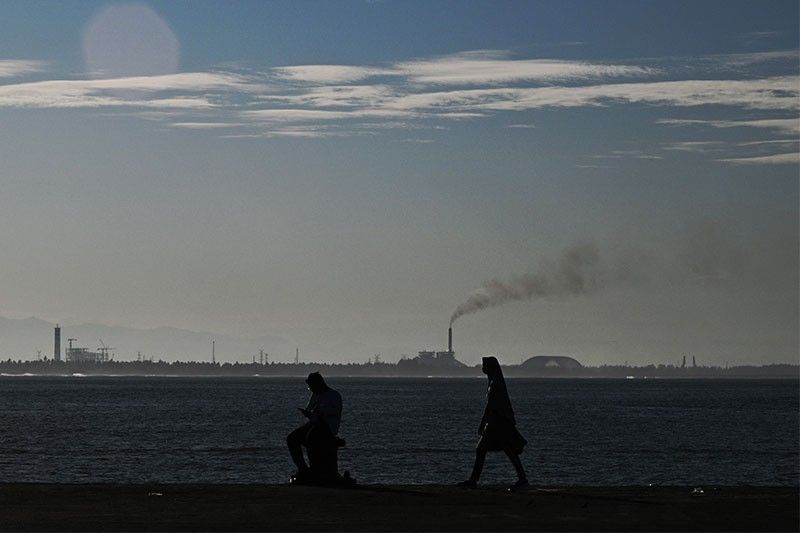Climate 'reality check': 2021 global CO2 emissions near record levels

GLASGOW, United Kingdom — Global CO2 emissions caused mainly by burning fossil fuels are set to rebound in 2021 to pre-Covid levels, with China's share increasing to nearly a third of the total, according to an assessment published Thursday.
Overall, CO2 pollution this year will be just shy of the record set in 2019, according to the annual report from the Global Carbon Project consortium, released as nearly 200 nations at the COP26 climate summit confront the threat of catastrophic warming.
Emissions from gas and highly polluting coal will rise this year by more than they dropped in 2020 due to the pandemic-driven economic slowdown.
Capping the rise in global temperature to 1.5 degrees Celsius above pre-industrial levels — as per the Paris Agreement — would limit mortality and damage, but requires slashing carbon emissions nearly in half by 2030 and to net zero by 2050, the UN's climate science authority has warned.
"This report is a reality check," co-author Corrine Le Querre, a professor of climate change science at Britain's University of East Anglia, told AFP.
"It shows what's happening in the real world while we are here in Glasgow talking about tackling climate change."
Waiting for the peak
The new report will come as bad news at the 13-day COP26 meeting, where a diplomatic spat saw the United States accuse China and Russia of failing to step up their climate action ambitions.
China on its own will account for 31 percent of global emissions this year after its economy accelerated out of the economic lull ahead of others.
Carbon pollution from oil remains well below 2019 levels, but could surge as the transport and aviation sectors recover from pandemic disruption, said the study in the journal Earth System Science Data.
Taken together, the findings mean that future C02 emissions could eclipse the 40-billion tonne record set in 2019, which some have predicted — and many hoped — would be a peak.
"We cannot rule out more overall growth of emissions in 2022 as the transport sector continues to recover," Le Quere said. "We are bound to have ups and downs over the next few years."
The latest figures are in line with a recent International Energy Agency (IEA) forecast that emissions from energy would hit an all-time high in 2023, "with no clear peak in sight".
"Perhaps we will start talking about peak emissions in 2023 or 2024?", said Glen Peters, research director at the Centre for International Climate Research in Oslo and a co-author of the report.
China surge
Looking at the national level, the report found a return to pre-Covid patterns among the world top four carbon polluters, which account for 60 percent of global CO2 emissions.
In China — which has pledged to peak its emissions by 2030, and reach net-zero by 2060 — economic growth spurred by government incentives will see emissions grow 5.5 percent this year compared to 2019, the last year not affected by Covid.
"The rebound in China was robust," said Peters. "It looks like China is in a phase of strong growth again."
India, the world's other emerging giant, is on track for a similar percentage increase in carbon pollution, and will account for seven percent of the total this year.
2021 emissions in the US and EU will drop 3.7 and 4.2 percent, respectively, and their share of global emissions will stand at 14 and 7 percent.
The wild card that could determine how quickly the world can finally bend the emissions downward is coal, the report made clear.
"Mostly it's about coal now," said Le Quere. "This is where the big uncertainties are."
Very little of the trillions of dollars chanelled to post-pandemic recovery was earmarked for green development, a trend that is continuing, she said.
'It is possible'
"Economic incentives now are about driving consumption, and this is really pushing industry, production and coal."
Worldwide, decarbonisation — mainly switching from fossil fuels to renewable — continues to be outpaced by the demand for energy, adding to emissions.
But the report was not bereft of positive signals.
Twenty-three countries accounting for a quarter of global emissions over the last decade — including the US, Japan, Germany, France and Britain — simultaneously saw strong growth and a significant decline in emissions, showing that the two can be decoupled.
For 15 of these nations, this held true even when the carbon emissions from the production of imported goods was included.
"This shows that these countries know how to do it, they demonstrate it's possible."
But the finding makes clear how daunting the Paris Agreement goals are, she added.
"If you want to reach net zero by 2050, you need to decrease emissions, on average, by 1.4 billion tonnes per year," she said.
"In 2020, during the pandemic, we had a drop of 1.6 billion tonnes — this shows you the scale of the action required."
Bookmark this page for updates on the United Nations climate summit, known as COP26. Photo courtesy of AFP/Tolga Akmen
Singapore announces it aims to achieve carbon neutrality by 2050, giving a firm date for the first time, and will look at using hydrogen as a major power source.
The city-state targets for carbon emissions to peak in 2030 at 60 million tonnes, a reduction of five million tonnes from the previous goal, Deputy Prime Minister Lawrence Wong said.
The Southeast Asian nation also has plans to look at developing low carbon hydrogen as a major power supply in the long term. — AFP
Australia will present a more ambitious UN emissions target "very soon" and is bidding to co-host a COP summit with Pacific island neighbours, Foreign Minister Penny Wong said Thursday, signalling a ground shift in climate policy.
During a first solo overseas visit since her centre-left government was sworn in, Wong admitted that on the climate, "Australia has neglected its responsibility" under past administrations.
She told hosts in Fiji's capital Suva that there would be no more "disrespecting" Pacific nations or "ignoring" their calls to act on climate change.
"We were elected on a platform of reducing emissions by 43 percent by 2030 and reaching net-zero by 2050," Wong said. — AFP
Countries have proposed to hold an extra biodiversity meeting in Nairobi in June as talks in Geneva tasked with saving nature entered their final day Tuesday without an agreement.
In a document uploaded on the conference website, dated Monday, countries suggest holding a new meeting in the Kenyan capital between June 21 and 26 to "continue negotiations" on the document and other issues.
The decision is subject to official approval by the Geneva meeting before it wraps up later Tuesday. — AFP
British Prime Minister Boris Johnson on Sunday hails a global accord to speed up action against climate change as "truly historic" and "the beginning of the end for coal power".
But he says his "delight at this progress" at the UN COP26 summit in Glasgow was "tinged with disappointment" because of a failure to secure the agreement of all countries to phase out hydrocarbons.
"Those for whom climate change is already a matter of life and death, who can only stand by as their islands are submerged, their farmland turned to desert, their homes battered by storms, they demanded a high level of ambition from this summit," says Johnson. — AFP
A UN climate summit text on Saturday urges nations to accelerate the phase-out of unfiltered coal and "inefficient" fossil fuel subsidies, after large emitters tried to remove the mention of polluting fuels.
The text, which comes after two weeks of frantic negotiations at the COP26 summit in Glasgow, omitted any reference to specific finance for "loss and damage" -- the mounting cost of global heating so far -- which has been a key demand of poorer nations.
The mention on Saturday of fossil fuels was weaker than a previous draft, which called on countries to "accelerate the phasing out of coal and subsidies for fossil fuels". — AFP
- Latest



























